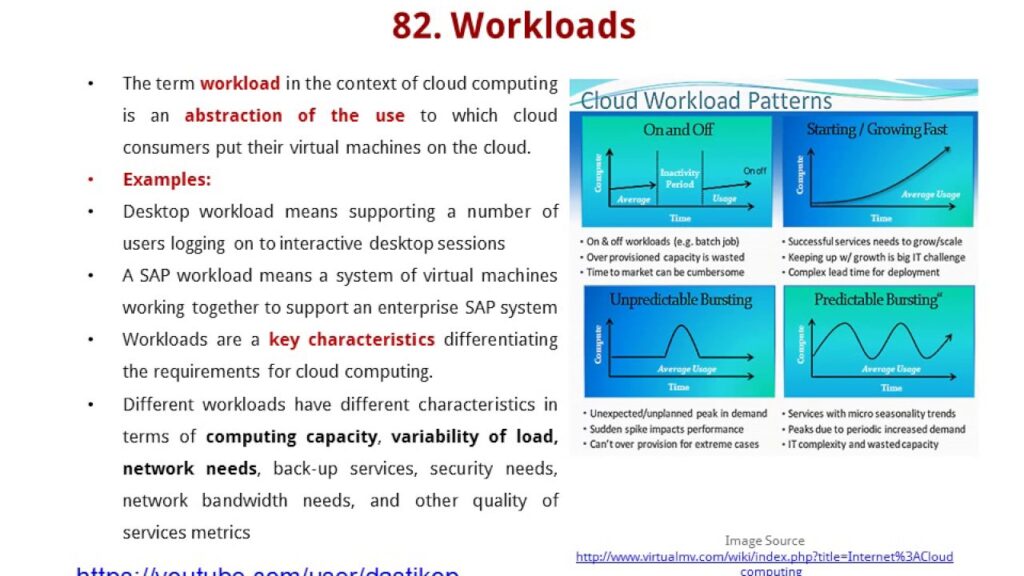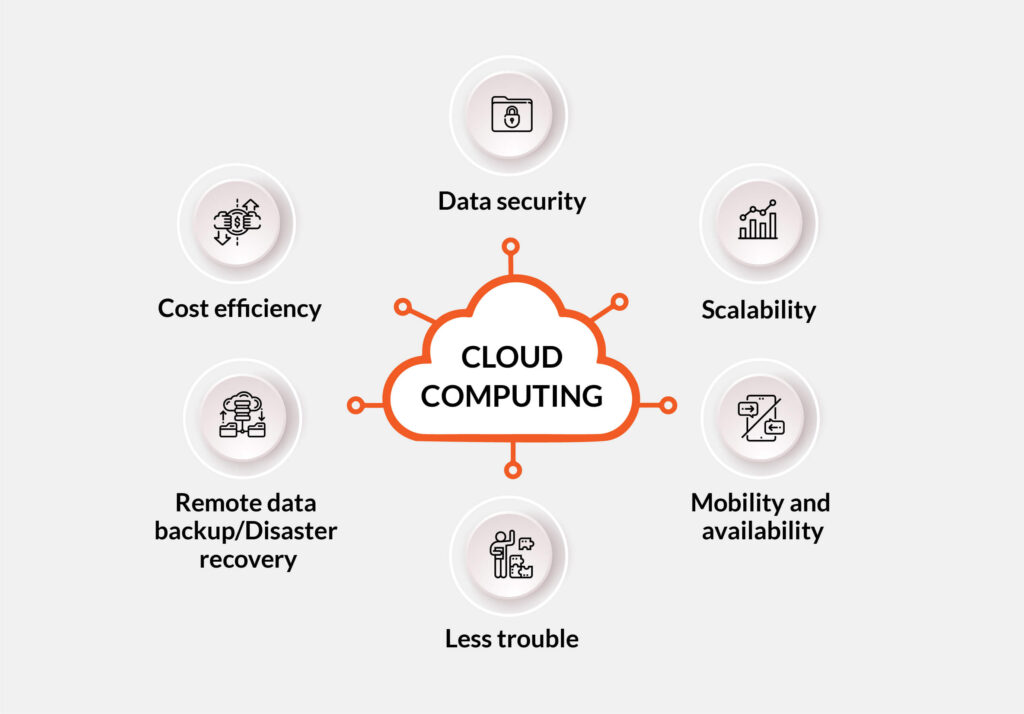Cloud computing has revolutionized the way businesses operate and manage their resources. In recent years, cloud computing has emerged as a technology that has drastically transformed the management of businesses, and it continues to transform the way organizations manage their operations today. With the advent of cloud computing, businesses no longer need to invest heavily in hardware and infrastructure to manage their operations. Instead, they can now shift their focus to managing their data and applications in the cloud, providing them with more flexibility, agility, and scalability in managing their operations.
Cloud computing has enabled businesses to save costs on hardware, software, and maintenance. With cloud-based services, businesses can now access software and applications from anywhere in the world, making it easier for them to manage their operations remotely. The cloud also enables businesses to scale their operations up or down depending on their needs, allowing them to adapt quickly to changing market demands. Furthermore, the cloud provides businesses with a centralized location to store their data, making it easier for them to access and analyze their data to make informed decisions. As such, cloud computing has become an essential tool for businesses seeking to streamline their operations and stay ahead in the competitive market.
Cloud computing is changing the way organizations manage their data, resources, and applications. It allows businesses to access data and applications from any device with an internet connection, while also enabling them to scale their operations up or down quickly. Cloud computing also makes it possible to automate processes and provide employees with more flexibility, allowing them to work from any location. Additionally, cloud computing reduces the need for hardware, software, and IT infrastructure, resulting in cost savings for organizations.

How Cloud Computing is Changing Management
Cloud computing is a technology that is revolutionizing how businesses store data and access applications. By leveraging the power of the cloud, companies can save money, improve efficiency, and increase collaboration. In this article, we will explore how cloud computing is changing the way businesses approach management.
Increased Data Security
With cloud computing, businesses can ensure that their data is stored safely and securely. Cloud providers have a number of measures in place to protect data, such as encryption and physical security measures. This increases the security of data and makes it easier for businesses to protect sensitive information. Additionally, cloud computing eliminates the need for businesses to maintain their own physical data centers, which can be costly and difficult to manage.
Cloud computing also offers increased scalability, which makes it easier for businesses to adjust their data storage needs as they grow or as their business needs change. This gives businesses more flexibility when it comes to managing their data and allows them to quickly adjust to changing market conditions.
Improved Collaboration
Cloud computing also makes it easier for businesses to collaborate with their teams. By using cloud-based applications, teams can easily share documents and data with each other, eliminating the need for physical meetings and paperwork. Additionally, cloud-based file sharing applications make it easier for teams to access files from any device, regardless of their location. This makes it easier for teams to stay connected and collaborate on projects from anywhere.
Cloud computing also makes it easier for businesses to manage remote teams. By leveraging cloud-based applications, businesses can quickly and easily track remote team members’ progress and update tasks as needed. Additionally, cloud-based applications make it easier for managers to monitor remote team members and ensure they are staying on track with their tasks.
Increased Efficiency
Cloud computing also makes it easier for businesses to streamline their operations. By leveraging cloud-based applications, businesses can quickly and easily access the data they need to make informed decisions. Additionally, cloud-based applications can automate mundane tasks and reduce the amount of time businesses spend on tedious tasks. This increases efficiency and allows businesses to focus their resources on more important tasks.
Cloud computing also makes it easier for businesses to access data from anywhere. This makes it easier for businesses to make informed decisions on the go and respond quickly to changing market conditions. Furthermore, cloud-based applications can be accessed from any device, making it easier for businesses to stay connected and up-to-date.
Improved Cost Savings
Finally, cloud computing can help businesses save money in the long run. By leveraging cloud-based applications, businesses can reduce their IT costs and avoid the need to purchase and maintain expensive hardware and software. Additionally, cloud-based applications make it easier for businesses to scale their operations up or down as needed, eliminating the need to purchase additional hardware or software. This can help businesses save money in the long run.
Cloud computing also makes it easier for businesses to access data from anywhere. This makes it easier for businesses to make informed decisions on the go and respond quickly to changing market conditions. Furthermore, cloud-based applications can be accessed from any device, making it easier for businesses to stay connected and up-to-date.
Improved Business Intelligence
Cloud computing also makes it easier for businesses to access insights and analytics. By leveraging cloud-based applications, businesses can quickly and easily access the data they need to make informed decisions. Additionally, cloud-based applications can provide businesses with real-time insights into customer behavior and trends. This allows businesses to identify opportunities for improvement and make more informed decisions.
Cloud computing also makes it easier for businesses to access data from anywhere. This makes it easier for businesses to make informed decisions on the go and respond quickly to changing market conditions. Furthermore, cloud-based applications can be accessed from any device, making it easier for businesses to stay connected and up-to-date.
Improved Scalability
Finally, cloud computing can help businesses scale their operations quickly and easily. By leveraging cloud-based applications, businesses can quickly and easily add new users or applications to their systems. This eliminates the need to purchase additional hardware or software and makes it easier for businesses to scale their operations as needed. Additionally, cloud-based applications make it easier for businesses to adjust to changing market conditions and quickly respond to customer needs.
In conclusion, cloud computing is revolutionizing the way businesses approach management. With cloud-based applications, businesses can increase data security, improve collaboration, increase efficiency, save money, access insights and analytics, and scale their operations quickly and easily. As businesses continue to adopt cloud computing, it is clear that it will continue to revolutionize business management.
Frequently Asked Questions
Cloud computing is revolutionizing the way businesses manage their operations, allowing them to be more efficient and cost-effective. Here are some common questions about how cloud computing is changing management.
What is Cloud Computing?
Cloud computing is a type of computing that relies on shared computing resources that are accessed over a network, usually the Internet. It provides users with access to virtualized computing resources, such as storage, memory, and processing power, that can be scaled up or down depending on their needs. Cloud computing is a cost-effective and efficient way for businesses to store and manage their data, applications, and workloads.
How Does Cloud Computing Change Management?
Cloud computing has changed the way businesses manage their operations. It provides organizations with a more cost-effective and efficient way to store and access their data, applications, and workloads. With cloud computing, organizations are able to reduce their IT costs and focus on their core business functions. Additionally, cloud computing allows businesses to quickly scale up or down their computing resources, enabling them to respond quickly to changing market conditions and customer needs.
What Are the Benefits of Cloud Computing?
The main benefits of cloud computing are cost savings, scalability, and flexibility. Cloud computing allows organizations to reduce their IT infrastructure costs and focus more on their core business functions. It also enables businesses to quickly scale up or down their computing resources, allowing them to respond quickly to changing market conditions and customer needs. Additionally, cloud computing provides businesses with greater flexibility, allowing them to easily deploy and manage applications and workloads.
What Are the Challenges of Cloud Computing?
One of the main challenges of cloud computing is security. As cloud computing relies on shared computing resources, it is important for organizations to ensure their data is secure. Additionally, organizations must have the right policies and procedures in place to ensure their data is protected from unauthorized access. Additionally, cloud computing can be difficult to manage, as organizations must ensure that their cloud computing environment is properly configured and maintained.
What Are the Best Practices for Cloud Computing?
The best practices for cloud computing include having the right policies and procedures in place to ensure data security, ensuring your cloud computing environment is properly configured and maintained, and regularly monitoring your cloud computing environment. Additionally, organizations should ensure that they have the right tools and resources in place to properly manage their cloud computing environment. Finally, organizations should educate their employees on the security risks associated with cloud computing and how to protect their data.

In conclusion, cloud computing has revolutionized the way businesses manage their operations. By providing a flexible, scalable, and cost-effective solution, cloud computing has enabled companies to focus on their core competencies and streamline their management processes. With the ability to access data and applications from anywhere in the world, cloud computing has made it possible for businesses to operate in a truly global environment.
However, as with any technological advancement, there are also challenges that come with cloud computing. Security concerns, data privacy, and vendor lock-in are just some of the issues that need to be addressed to fully realize the benefits of cloud computing. Despite these challenges, it is clear that cloud computing is changing the way management is done and will continue to shape the future of business. As more companies move to the cloud, it is important for managers to stay informed and adapt to new technologies to remain competitive in today’s fast-paced business environment.



